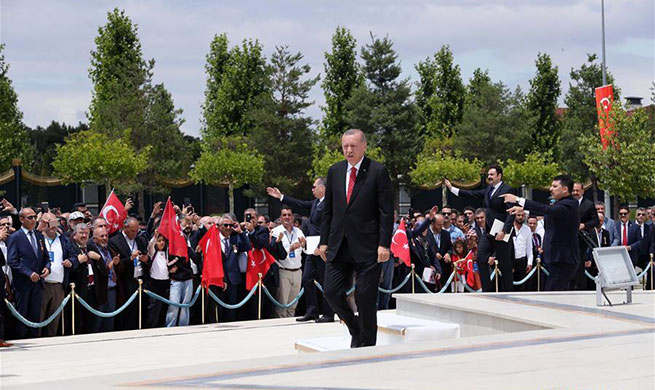CAPE TOWN, July 16 (Xinhua) -- HIV/AIDS mortality remains high worldwide, reminding the international community that the fight against the pandemic is far from over, according to the UNAIDS Global Report 2019 released on Tuesday.
The report says 770,000 people died of HIV/AIDS worldwide in 2018, only a 30,000 reduction from 2017, compared to 800,000 in 2017 and 840,000 in 2016.
The report was released in Eshowe, South Africa's KwaZulu-Natal province. According to UNAIDS, South Africa was nominated out of the 193 United Nations member states to host the official launch of this report in view of its remarkable and outstanding efforts in the fight against HIV/AIDS.
In 2016, the UN member states endorsed the goal of cutting HIV/AIDS deaths by 50 percent by 2020, to less than 500,000 per year.
Six months to this deadline the world is far from achieving this target, says the report.
The pace of progress in reducing new HIV infections, increasing access to treatment and ending AIDS-related deaths is slowing down, the report says.
The report shows a mixed picture, with some countries making impressive gains while others are experiencing rises in new HIV infections and AIDS-related deaths.
Globally, around 1.7 million people became newly infected with HIV in 2018, a 16-percent decline since 2010, driven mostly by steady progress across most of eastern and southern Africa, the report shows.
South Africa, for example, has made huge advances and has successfully reduced new HIV infections by more than 40 percent and AIDS-related deaths by around 40 percent since 2010, according to UNAIDS.
However, there is still a long way to go in eastern and southern Africa, the region most affected by HIV, and there have been worrying increases in new HIV infections in eastern Europe and central Asia (29 percent), in the Middle East and North Africa (10 percent) and in Latin America (seven percent), the report says.
The report calls for greater urgency as global gains slow and countries show mixed results towards 2020 HIV reduction targets.
According to the report, key populations and their sexual partners now account for more than half (54 percent) of new HIV infections globally. In 2018, key populations - including people who inject drugs, gay men and other men who have sex with men, transgender people, sex workers and prisoners - accounted for around 95 percent of new HIV infections in eastern Europe and central Asia and in the Middle East and North Africa.
However, the report also shows that less than 50 percent of key populations were reached with combination HIV prevention services in more than half of the countries that reported.
This highlights that key populations are still being marginalized and being left behind in the response to HIV, says the report.
"We urgently need increased political leadership to end AIDS," said Gunilla Carlsson, UNAIDS Executive Director. "This starts with investing adequately and smartly and by looking at what's making some countries so successful."
Ending AIDS is possible if focus is placed people, not diseases, road maps are created for the people and locations being left behind, and a human rights-based approach is taken to reach people most affected by HIV, said Carlsson.
The report stresses the urgency for countries and communities most affected by HIV to get the necessary resources and support to apply the lessons of community approaches of HIV testing and treatment.
The report urges the international community to ensure that 30 million people living with HIV have access to treatment through meeting the 90-90-90 targets by 2020.
The 90-90-90 targets mean that 90 percent of people living with HIV know their status, 90 percent of those are on antiretroviral treatment and 90 percent of those have a suppressed viral load.
The 90-90-90 targets are an important indicator of the success of a country's HIV response.

















